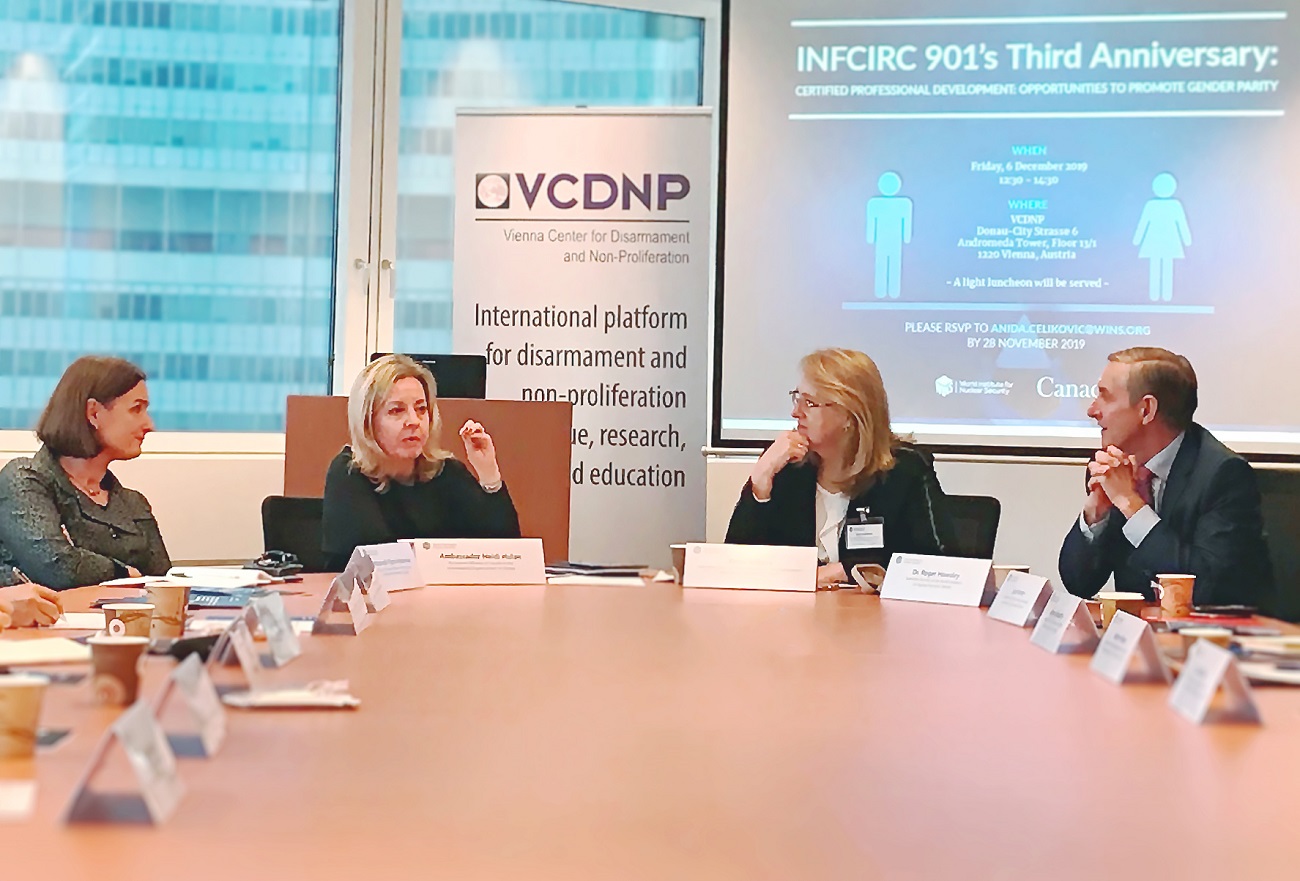WINS and the Permanent Mission of Canada co-hosted a panel discussion on the links between gender parity and demonstrable competence in honour of the third anniversary of Information Circular 901 at the Vienna Centre for Non-Proliferation and Disarmament.
The panel, presented by VCDNP Executive Director Elena Sokova, was composed of Canadian Ambassador Her Excellency Ms Heidi Hulan, Norwegian Ambassador Her Excellency Ms Kjersti Andersen and WINS Executive Director Dr Roger Howsley.
“The human factor is a key way we have to improve nuclear security,” Ambassador Hulan said, adding that certified training is an important step in promoting security culture. She also pointed out that certification boosts participants’ confidence and promotion prospects, which is especially relevant for women.
“Nuclear security may seem like a niche issue, but it’s an issue with cross-cutting, broad importance,” she continued. “Vigilance is ever more relevant.”
Dr Howsley spoke about the importance of replacing the common practice of relying on “presumed” competence rather than “demonstrable” competence during recruitment. One important example was the presumption in some organisations that the best hires for nuclear security come from law enforcement and the military, sectors that traditionally have quite low representation of women. Where still practised, this presumption leads to discriminatory hiring practices.
“The old-fashioned view of security management is that it is a role best suited to men with previous experience in the uniformed services. There are some great candidates from these sectors, but at no time should it be the only recruitment criterion. All organisations must examine their recruitment practices for security-related positions and make sure that they are recruiting people that fulfil the needs of the organisation looking forwards, without a gender bias,” Dr Howsley said. “That means using well-designed competency frameworks for security management to support hiring, promotion and retention – competency frameworks that include key competencies relating to risk management, nuclear technology and engineering, and the interface with nuclear safety.”
“Gender parity requires leadership,” Ambassador Andersen said, adding that Norway’s high level of gender parity was brought about by deliberate policies, strong cross-party networks and dedicated politicians. She noted that recruiting candidates with the right background could still be challenging. “We need leaders at every level who understand the dynamics of how we choose whom we hire.”
Ambassador Hulan noted that a real change happened in Canada following from the strong message from the top of the government that parity was a priority.
Following the formal remarks, IAEA Deputy Director General Mary-Alice Hayward announced that newly appointed IAEA Director General Rafael Mariano Grossi has made gender parity a priority for the organisation during his tenure.
“Director General Grossi wouldn’t make it a priority if it weren’t possible right now,” Ms Naida Dzigal, President of Women in Nuclear IAEA, said, as the participants welcomed the news.
Mr Spencer Fields, First Secretary of the US Mission to International Organizations in Vienna, pointed out that gender parity varies at different seniority levels within organisations, and it is inappropriate to aggregate all women in an organisation to claim progress if the largest number of women in an organisation are in the most junior positions. “Gender parity across the board is very important,” he said.
The Joint Statement on Certified Training for Nuclear Security Management, published by the IAEA as INFCIRC 901 on 6 December 2016, outlines commitments to support the WINS Academy in its efforts to expand its international certification programme through advocacy, peer review support and contributions. IAEA Information Circular 901 reads:
We welcome other States, supported by industry and civil society, to provide a tangible commitment in support of the WINS Academy and certified professional development for nuclear security. Together we can help to ensure that nuclear and other radioactive materials remain secure under the management of demonstrably competent professionals.
INFCIRC 901 follows up on Information Circular 869 of 2014, which included among its 14 optional proposed actions supporting or participating “in the development of World Institute for Nuclear Security best practice guides and training activities.” The INFCIRC 901 document was submitted by the Government of Canada and has been endorsed by Finland, Hungary, Indonesia, Jordan, Kazakhstan, Malaysia, Mexico, the Netherlands, New Zealand, Norway, Romania, Thailand, the UK, and the USA. Canada and WINS welcome more countries to subscribe to INFCIRC 901 and make concrete commitments to both demonstrable competence and gender parity in the field of nuclear security.
